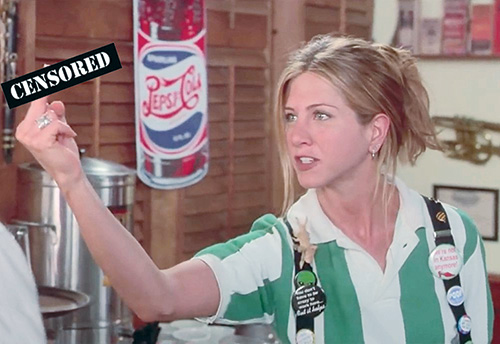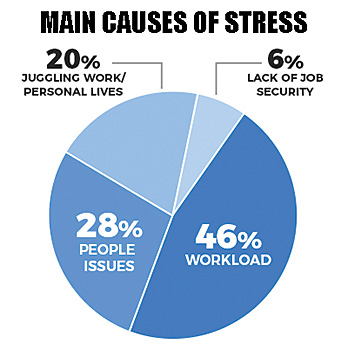Stressed out at work?
 If you’re feeling stressed at work, take a number. It’s a big club. Nearly three-fourths of American workers are stressed by at least one thing at work. U.S. workers put in more hours on the job than the labor force of any other industrial nation, where the trend has been just the opposite.
If you’re feeling stressed at work, take a number. It’s a big club. Nearly three-fourths of American workers are stressed by at least one thing at work. U.S. workers put in more hours on the job than the labor force of any other industrial nation, where the trend has been just the opposite.
Studies show that job stress has escalated over the past few decades. These increased levels of job stress include the perception of having little control but lots of demands and have been associated with increased rates of heart attack, hypertension, and other disorders.
What is stressing you at work? Some cite not getting paid enough. A recent study noted that 11 percent of those surveyed cited pay as their biggest source of stress, followed by annoying co-workers (10 percent), commuting (nine percent), unreasonable workload (nine percent), and working in a job that isn’t their chosen career (eight percent).
 The report by the American Institute of Stress (yes, there is such a thing) showed:
The report by the American Institute of Stress (yes, there is such a thing) showed:
• 40 percent of workers reported their job was very or extremely stressful.
• 25 percent view their jobs as the number one stressor in their lives.
• 75 percent of employees believe that workers have more on-the-job stress than a generation ago.
• 29 percent of workers felt quite a bit or extremely stressed at work.
• 26 percent of workers said they were often or very often burned out or stressed by their work.
• Job stress is more strongly associated with health complaints than financial or family problems.
HOW TO TELL IF YOU’RE STRESSED
Stress is a sneaky condition. Over time, we get used to it. If you have any question at all about whether you’re stressed out, here are a few tell-tale signs, according to the magazine Psychology Today:
• You’re less patient and sympathetic listening to other people’s problems.
• You tend to discourage dialogue.
• Your dedication to exercise, diet, and friendship is waning.
• You feel trapped.
• You give people a lot of “Yes, but” answers to their suggestions.
• You’ve lost your sense of humor.
HOW WE RESPOND TO STRESS
One prominent stress psychologist uses a driving analogy to describe the three most common ways people respond when they’re overwhelmed by stress:
• Foot on the gas – An angry or agitated stress response. You’re heated, keyed up, overly emotional, and unable to sit still.
• Foot on the brake – A withdrawn or depressed stress response. You shut down, space out, and show very little energy or emotion.
• Foot on both – A tense and frozen stress response. You “freeze” under pressure and can’t do anything. You look paralyzed, but under the surface you’re extremely agitated.
WOMEN MORE STRESSED?
According to surveys, women are more stressed about money than men: 14 percent of women in the work-stress survey cited pay as their top stressor, compared to eight percent of the men. Maybe that’s because, even in these liberated times, there is still a lack of pay parity for women.
 Speaking of the times, an odd result of the survey is that the fear of losing a job is subsiding. The number of people who cited fear of being fired or laid off as a top source of stress dropped to four percent in this year’s survey from nine percent last year.
Speaking of the times, an odd result of the survey is that the fear of losing a job is subsiding. The number of people who cited fear of being fired or laid off as a top source of stress dropped to four percent in this year’s survey from nine percent last year.
Talking about how stressed out you are will actually make you more stressed, Psychology Today says. And it’s contagious. You can bet all of your friends want to know how busy you are all the time.
VIOLENCE A SERIOUS PROBLEM
According to two studies, the United States has the dubious distinction of having the highest violent crime rate of any industrialized nation. An average of 20 workers are murdered each week in the U.S., making homicide the second highest cause of workplace deaths and the leading one for females. More than 18,000 non-fatal violent crimes such as sexual and other assaults also occur each week while the victim is working, or about a million a year. The figures are probably higher since many are not reported.
Certain dangerous occupations like police officers and cab drivers understandably have higher rates of homicide and non-fatal assaults. Nevertheless, postal workers who work in a safe environment have experienced so many fatalities due to job stress that “going postal” has crept into our language. “Desk rage” and “phone rage” have also become increasingly common terms.


Leave a Reply